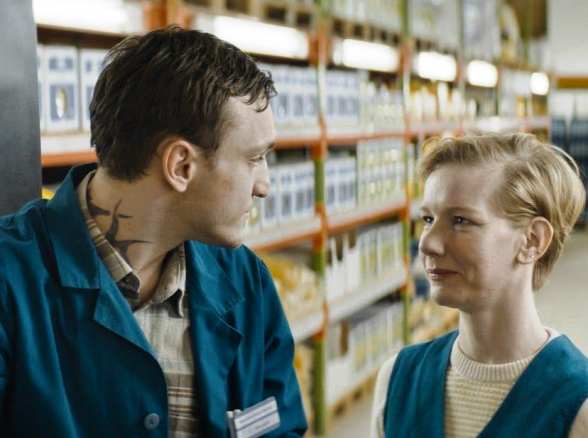 Life on the job—in this case, the night shift at a supermarket box store—forms the background of German director Thomas Stuber’s gentle drama of love and friendship.
Life on the job—in this case, the night shift at a supermarket box store—forms the background of German director Thomas Stuber’s gentle drama of love and friendship.
Most of us spend close to half of our waking adult lives at work, but I would venture to guess that less than five percent of narrative films take work as their subject. And it’s easy to see why—we seek drama and excitement at the movies, and our jobs don’t usually offer that. They’re repetitive and regular, and on film one would think it would be boring. Still, there’s a largely unexplored trove of experience begging for artistic treatment. German director Thomas Stuber has met that challenge with his second feature, In the Aisles.
The picture opens in a mood of mellow humor. The strains of Strauss’s The Blue Danube play over shots of motorized pallets and forklifts gliding through the aisles of a big supermarket box store. Ironic echoes from 2001: A Space Odyssey are perhaps intentional. It turns out that the manager likes to pipe classical music through the store’s sound system for the night crew.
As the story begins, we meet a new member of that crew, Christian Gruvert, played by Franz Rogowski, who I’d seen before in two excellent recent German films: Victoria and Transit, and who bears a strong resemblance to Joaquin Phoenix. His character here is withdrawn, doesn’t speak very much, yet pays close attention to what others say, as you can tell by his intense eyes and calm expression.
He’s assigned to be trained in his new job by Bruno, a gruff but extremely patient man played by Peter Kurth. The gradual development of friendship between these two is one of the film’s fine touches. The weary company veteran, who used to drive trucks before the supermarket chain moved him to his present position managing the beverage section, and his quiet, enigmatic pupil, communicate through low-key conversations during their breaks, the older man understanding a lot about Christian without having to be told.
Christian soon finds himself falling for a woman working in the frozen foods section named Marion, played by Sandra Hűller, whom you might remember as the daughter in the award-winning comedy-drama Toni Erdmann from a few years ago. She teases Christian, calling him “newbie” and then flirts with him a little. Christian eventually learns that she’s unavailable, but it doesn’t change his affection for her. His own story, hinted at by the tattoos that he has to hide at work with long-sleeved shirts, is drawn out eventually by his perceptive friend Bruno.
The framing of the workplace as a location where relationships develop, of one sort or another, constitutes a great deal of the charm of In the Aisles. Throughout the film, Stuber sticks to the rhythm of life on the job: Christian’s tentative trial of learning how to use a forklift, petty conflicts between employees, smoke breaks, and the employee lounge where they drink coffee dispensed from a vending machine. The film made me think about all the people who work in these retail stores, that we go to in order to shop, but for them is the place where they spend most of their time. It also evokes the lonely time of night shifts, where the main lights in the superstore have been turned off, and the employees clean up or stack and replace products. This vivid depiction of real life at work, which has its pleasures and pains, forms a solid basis for the film’s personal drama. The mood varies from the humor of the opening scenes to a more serious tone, all infused with intelligence and gentle humanism. In the Aisles offers a poignant glimpse into the mysteries of a familiar world.

Gravity, directed by Alfonso Cuaron, steps away from the Star Trek / Star Wars type outer space film we’ve become used to, with their...

Minari, the latest film from writer-director Lee Isaac Chung, tells the story of an immigrant Korean family’s struggle to make a new life in...

Time profiles a woman fighting for her husband to get parole, against the background of unequal sentencing of African Americans, while MLK/FBI tells of...